A cantora Marlena Shaw fez história por onde passou. Seja no jazz, blues, soul ou na disco music, sua voz sempre encaixou perfeitamente nas canções. Passou por diversas gravadoras de prestígio, como Columbia, CBS, Verve, Cadet, além de ter sido a primeira mulher a assinar um contrato com a lendária Blue Note Records em 1972. Com mais de cinquenta anos de carreira, Marlena Shaw vem ao Brasil pela primeira vez pra dois shows no SESC Pompéia (ingressos já esgotados) e tivemos o privilégio de bater um papo com ela que você lê a seguir. Muito obrigado, Marlena Shaw!
SPM: É verdade que a sua primeira aparição em palco foi com dez anos de idade no palco do Apollo Theater? Como foi essa experiência pra uma menina tão nova?
MS: Eu estava extremamente nervosa. Mas estava junto com o meu tio que tocava trumpete e cantava. Eu tocava piano e cantava também. Então não estava exatamente sozinha e também não estava tão nervosa assim, pelo que me lembro agora. A poítica do Apollo era a seguinte: se você ganhasse por quatro semanas seguidas você tinha a oportunidade de se apresentar no grande show e não apenas na noite dos amadores. Havia uma garota cega que estava em sua terceira semana e eles deram o título a ela. Mas pediram pra eu voltar na semana seguinte, porem sozinha, pois descobriram que meu tio era profissional e o concurso era para amadores. Foi uma experiência e tanto entrar no palco sozinha, eu tive que usar um vestido emprestado e usei pequenos saltos pela primeira vez. Todo mundo ria de mim até a hora que comecei a cantar e as pessoas começaram a me aplaudir. Foi um momento bem interessante.
SPM: Então o seu primeiro contato com a música veio através do seu tio?
MS: Sim, eu fui criada pela minha avó e meu tio vivia na casa dela. Ele que me ensinou a tocar piano. Na verdade eu o odiava, pois ele era muito rígido comigo. Eu ficava muito feliz quando minha vó voltava para casa e mandava ele parar (risos).
SPM: Na década de 60 você já estava no circuito dos clubes de jazz em NYC. Os clubes de jazz eram a forma de se ter visibilidade pra conseguir um contrato com as gravadoras?
MS: Naquele tempo não haviam pessoas de gravadoras vindo ver artistas. Você tinha que ser recomendado por alguém e, pra mim, isso não aconteceu até eu entrar no Playboy Club, meu primeiro trabalho em Chicago. Então um dos garotos que trabalhava lá ligou para a Caddet Records e eles vieram me ver na semana seguinte. Antes do fim da semana eu tinha um contrato assinado com eles.
SPM: Seus dois primeiros discos pela Caddet Records revelaram uma cantora versátil que passava pelo blues, soul, jazz e pop standards. Essa versatilidade toda veio naturalmente de você ou foi uma idéia dos produtores e arranjadores?
MS: Provavelmente foi mais desenvolvido com os produtores. Como era o meu primeiro disco em uma gravadora eu estava super animada para gravar e estar em um disco solo. Eles falavam, ‘vamos tentar isso’, ‘vamos tentar aquilo’ e acredito que de acordo com o som da minha voz as músicas eram escolhidas.
SPM: Antes de você assinar com a Blue Note, você ficou alguns anos em turnê com o Count Basie, certo? Como foi esse período?
MS: Fan-tas-ti-co! Os arranjos de sua banda eram, em sua maioria, escritos por Frank Bostrom. Lembro que eu fui até a casa do Frank e ele me passou as músicas e como iríamos fazer seus arranjos. Meu grande problema era o Blues, eu acreditava que eu não conseguiria cantar Blues, então fiz um medley de todos os Blues que eu conhecia dele como “Going To Chicago”, “Everyday I Have The Blues” e “Kansas City Shout”. Juntei todas estas músicas e o Frank disse que eu era muito boa cantando as músicas daquele jeito e que ele faria qualquer coisa que eu quisesse. Eu achei que ele era maluco! Mas acabou funcionando muito bem. Ah, não posso deixar de lado o Chico O’Farrill, cubano, que também fez alguns arranjos espetaculares pro Count Basie.
SPM: Em 1972 você assinou contrato com o prestigioso Blue Note Records se tornando a primeira artista feminina da gravadora. Como aconteceu esse contrato?
MS: Primeiro eu preciso te dizer que era para eu ter assinado com a United Artists, porém a Shirley Bassey tinha em seu contrato que nenhuma outra mulher, especialmente negra, poderia assinar com a gravadora, e foi assim que eu acabei assinando com a Blue Note. Mas você sabe que a Shirley Jordan foi a primeira mulher a cantar em um disco da Blue Note mas ela não assinou com a gravadora.
SPM: Dentre esses álbuns pela Blue Note, um chamou muita atenção também pelo título: “Who Is This Bitch Anyway?”. Qual foi o motivo desse título? Tem alguma história por trás?
MS: Naquela época havia um album bastante popular do Richard Pryor com um nome bem sujo que eu não me recordo agora, então eu decidi por “Who Is This Bitch, Anyways?” e também por causa de uma história engraçada. Eu estava em Saint Louis ensaiando durante o dia e eu ouvi um garoto tocando uma música minha na Jukebox. Na época eu estava com o single chamado “I Just Don’t Want To Be Lonely” e ele amou. Ele colocava moedas na máquina sem parar e quando já estava de noite eu fui no bar e ele continuava lá parado e já super bêbado. O dono do lugar, já enjoado, disse: “A moça que fez este album está aqui” e que ele teria que desligar a máquina. Então ele se virou, olhou para cima e disse “Who is this bitch, anyways?” (risos). Então estas foram as duas coisas que aconteceram que me fizeram pensar em manter este nome.
SPM: E depois de tanta história escrita na música, o fim dos anos 70 e início da década de 80, ainda traria você em nova fase na Columbia Records como uma das principais representantes da Disco Music. Como isso aconteceu?
MS: Sim, claro! É engraçado pois grande parte do disco “Take a Bite” já havia sido gravado, porem ninguém conseguia cantar ou se conectar com ele. Então escrevi algumas coisas que os jovens iriam se conectar. Eu gostei da ideia, apresentei novamente um medley e o final acabou sendo a maior parte para mim. As pessoas amavam dançar e quando chegava na parte do “Touch Me In The Morning” (cantarolando) as crianças começavam a gritar e eu não conseguia nem ouvir a música. Eu amava isso. Eu me diverti muito e fui muito bem paga também (risos).
SPM: Os shows que você fará nos próximos dias terão uma platéia razoavelmente jovem. Muitos dos seus novos fãs não tinham nem nascido quando você lançou seus primeiros discos. Como você conseguiu manter essa carreira de sucesso nesses mais de cinquenta anos de carreira?
MS: Eu acredito que as pessoas em geral reconhecem a verdade, elas reconhecem que não é artificial. Eu acho que isso fala com todas as gerações. Há cinco anos atrás eu estava em Estocolmo e o público foi incrível. Eles tinham leis de álcool então os jovens não podiam ficar na area onde vendiam bebidas alcoolicas. A promoter do show, bem esperta, pediu para que abrissem a porta do salão e os jovens podiam assistir dali, eles ficavam todos juntos ali. Eu tinha uma platéia de 18 a 80 anos, o que me emocionou muito. Eu também preciso dar crédito aos Disc Jockeys, que sempre tocaram as minhas músicas nas discotecas durante todas essa décadas e a juventude sempre se apaixonou por elas. E, claro, os comerciais. Eles se apaixonaram por “California Soul” e a música estava por toda parte. Eu acredito que uma vez que você chega aos comerciais de TV, você acaba tendo retorno dos jovens.
SPM: A sua canção “Woman Of The Ghetto”, do disco “Spice Of Life” é uma de suas músicas mais aclamadas pela nova geração. É uma canção forte e intensa. Por que você acha que ela inspira tanto até os dias de hoje?
MS: Porque estamos na mesma, né? Temos os mesmos problemas, nada mudou muito. Ainda tem muita gente que se acha melhor que você, que continua te ignorando, levantando a cabeça e se sentindo superior. Eu ainda sinto as mesmas frustrações, mesmo agora tendo dinheiro pra viajar, fazer o que eu bem entender. Volta e meia durante as viagens eu vejo coisas abusivas que atingem fundo no coração e eu continuo fazendo o possível pra que isso mude.
SPM: Você gosta de música brasileira? Tem algum artista daqui que te inspirou?
MS: Eu estive em um festival na Venezuela e o Milton Nascimento estava na programação. Eu me apaixonei por ele, que voz incrível, que presença, tão real. Eu me senti inspirada por ele. Mas eu não conheço muito a música daqui. Eu não faço mais isso, é tão estranho. Eu me lembro que eu costumava ouvir muitos vinis, mas eu tenho cinco filhos, e quando voce está fora das turnês e tem cinco filhos e uma casa, voce nao tem tanto tempo assim. Eu escutava os discos e treinava no piano, mas infelizmente eu nunca tive uma coleção de músicas brasileiras
SPM: Minha última pergunta. Sua banda aqui no Brasil para os shows deste final de semana serão com os amigos do Bixiga70. Como está sendo trabalhar com eles nesses primeiros dias de ensaio?
MS: Nós ensaiamos ontem e eu tenho certeza que será muito bom. É fácil de trabalhar com eles, sem frescuras, sabe? Estamos nisso juntos. Estou gostando muito. Eles escutam e querem fazer o melhor, isto é o que importa, a música, né? E não “Quem é Marlena Shaw”. Se você quiser saber isso, então pergunte aos meus netos (risos).
___________________________________________________________________________________________________________________
You were born in 1942 in NYC and with only ten years you were already on the Apollo Theater stage. Could you tell us how was your first contact with music and about this experience in the Apollo with a such young age?
I was extremely afraid, however I was then working with my uncle who was playing trumpet and singing and I was playing piano and singing. So I wasn’t exactly alone and wasn’t nervous as I recall now. The apollo policy was if you won for four straight weeks then you got the opportunity to be in the big show and not just in the amateurs night. There was a blind girl who had won three weeks and this was her fourth week and they gave it to her but they asked me to come back by myself because they have found out my uncle was a professional and it was strictly for amateurs. It was quite an experience to walk on the stage alone, I had to use a dress that was borrowed and it was my first time in little hills and they were laughing at me until I started to sing and they started applauding, so it was an interesting time.
So your first contact with music came from your uncle?
Yes, I was raised by my grandmother, and my uncle was still living at home so he taught me piano and basically I hated him because he was very hard on me to learn how to play, so yes, I was very happy when my grandmother came home and made him stop (laughs).
On the 60’s you were already in the jazz clubs of NY. How was this period? Did jazz clubs play a key role towards exposing to artists to record labels?
At that time there weren’t record people who came to see somebody. You mostly has to be recommended and that didn’t happen until I was already in the Playboy circuit, my first job in Chicago. Then one of the guys who worked for the Playboy called Caddet Records and they came. Before a week I had a contract signed.
Your first twos buns by Chess/Caddet Records revealed a versatile singer who passes by blues, soul, jazz and pop standards in a time where music were much more segmented in styles. This amazing versatility for that time came naturally or was it developed together with your producers and arrangers?
Probably arranged more with the producers. As it was my first album, I was just excited to be on a solo album. They said, lets try this, let’s try that and I suppose whatever they liked by the sound of my voice that’s how the songs were selected.
Before signing with Blue Note you were a few years on tour with Count Basie, right? How was this period for you?
Fan-tas-tic! The arrangements for his band were mostly written by Frank Bostrom. I remember I went to Frank’s house and he went over the songs and how we were going to arrange it. My biggest problem was the blues, I didn’t think I could sing the blues, so I made a medley of every blues I knew from him like “Going To Chicago”, “Everyday I Have The Blues” and “Going To Kansas City” so we put all of those songs together and Frank said that I was doing good at singing the music like that and I will just do whatever you want. I thought he was crazy! But it worked out very well! I don’t want to leave Chico O’Farrill behind, the cuban man, he did a couple of amazing arrangements too.
In 1972 you signed a prestigious contract with Blue Note Records becoming the first lady of the label. How this contract happened? What did that mean at that moment?
6. First let me tell you, I was supposed to be signing with United Artists however Shirley Bassey had in her contract that she didn’t want no other woman, specially black on the label so that’s how I became the first woman to actually sign with Blue Note. But you do know that Shirley Jordan was the first woman to sing on a blue note album but she didn’t sign.
Among these albuns by Blue Note, “Who Is This Bitch, Anyway?” called a lot of attention. What’s the reason between this title? Any story behind?
At that time there was a very popular Richard Pryor album with a very raw name that I can’t remember now, then I decided to go with ”Who Is this bitch anyways?” and also because of a funny story. I have been in Saint Louis as I was rehearsing that afternoon and I heard this guy playing the Jukebox. At that time I had a record called “I Just Don’t Want To Be Lonely” and he loved it, he kept on putting quarters in and after some time it was night already and he was still there hanging and pretty drunk. The owner of the club said, already mad, said: “The lady who did that record is here” and that he had to pull the plug. So he turned around, looked up and said “Who is this bitch anyways?” (laughs). So that was two things that told me that I’d better hold on to that name.
After a long and successful career in music, at the end of the seventies and in the eighties you had your new phase in Columbia as one of the main representatives of the disco music. How was this moment for you? Do you liked Disco Music before?
Yes, absolutely! But mostly on the “Take a Bite” album that had already been recorded but nobody could sing it or connect with it, so I wrote things that would connect the seventeen. I liked the idea of a medley again and of course the ending became the biggest part for me. People loved dancing and then when the “Touch me in the morning” started, kids start screaming and I wouldn’t hear the music. I loved this, I had a lot of fun and I paid very well too (laughs).
The concerts that you are having here in Brazil would have a quite young audience. Many of your fans were not even born when you released some of your first albuns. How did you manage to maintain the success throughout more than 50 years?
I think people in general recognize the truth, they recognize it’s not artificial. I think that is what speaks to every generation.About 5 years ago I was in Stocolm and it was an amazing audience. There were drinking laws so the young people could not be in the area where they sold alcohol, so the producer was very smart, she had them to open another door and the younger people came in the door, so they were still there but in another area all together. So I had people from 18 to 80 years old, it was very touching for me. And the success is also due to the disc jockeys who just played the songs at the dance clubs a lot so the younger generation fell in love with that. And then of course, the commercials, they fell in love with “California Soul” and it was everywhere. I think once you hit television with commercials, kids respond to that also.
The song “Woman of the ghetto” from the album “Spice of Life” is one of your most successful song among the new generation. It’s a strong and intense song. Why do you think does it inspires so much people until nowadays?
Because it’s the same, isn’t it? We have the same problems, it hasn’t changed. There’s been people that still want to be better than you, they still want to hold you neck down.I still feel the frustrations even now that I have enough money to travel wherever I want to travel but even now and then during the trips I see people getting abused and it still goes to my heart and I try maybe to change it.
Do you like brazilian music? Have you felt inspired by any brazilian artist?
I went to a festival in Venezuela and Milton Nascimento was on the program and I fell in love with him, just an amazing voice, presence, so real. I’ve been inspired by him. But I don’t know a lot about brazilian music.Its so strange, I don’t do it anymore, I remember when I used to play lots of vinyls, but I have five children and when you come off the road and you have five children and a house, you don’t really have so much time. I used to listen to the albums and I was practicing piano but unfortunately I never got a Brazilian music collection.
My last question. Your band here in Brazil for this weekend concerts will be my friends from Bexiga70. How has been these first days of working with them?
We had a rehearsal yesterday and I’m sure it will go very well. Its easy to work with them, no “prima donas” you know? We’re on this together. I liked to play with them, they were listening and they wanted to make it better, that’s what it’s important. Its about music, isn’t it? And not about “Who is Marlena Shaw”, if you want to know that ask my grand babies (laughs).
Pra ouvir (To listen):
Woman Of The Ghetto
California Soul
Liberation Conversation
Look At Me Look At You
Touch Me In The Morning
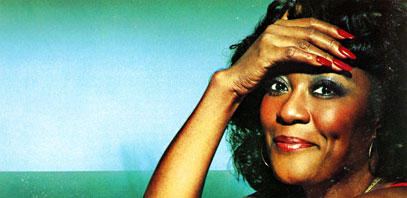
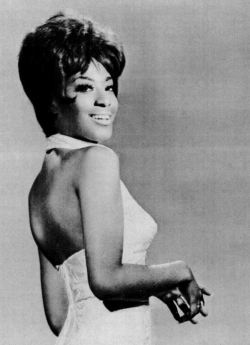
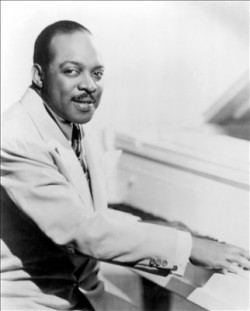
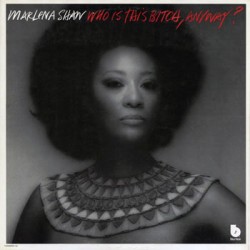
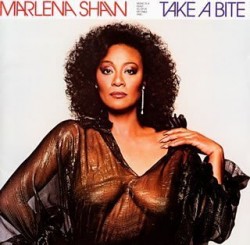
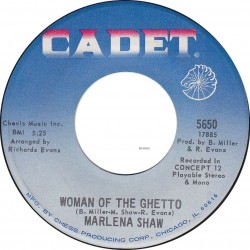




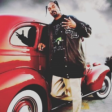
Comentários